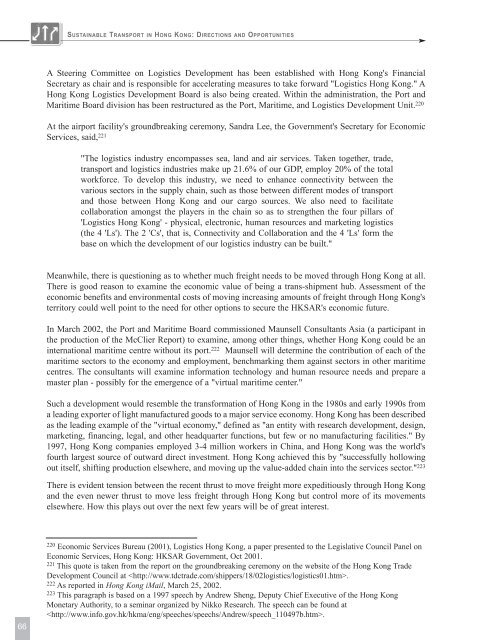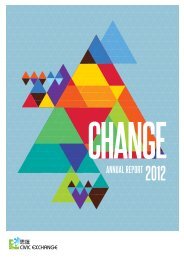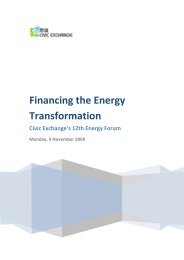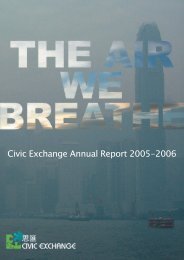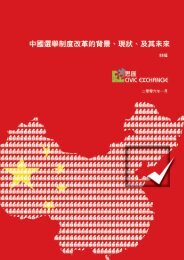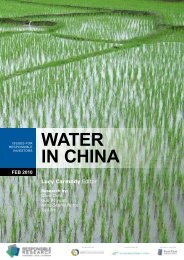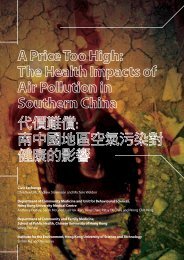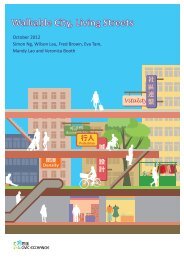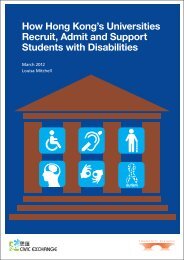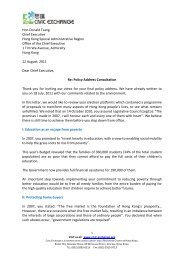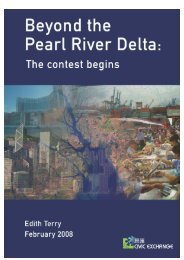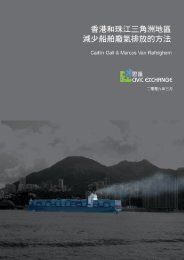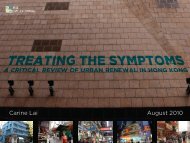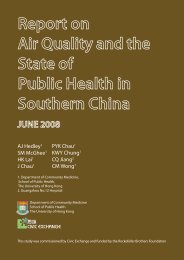Untitled - Civic Exchange
Untitled - Civic Exchange
Untitled - Civic Exchange
Create successful ePaper yourself
Turn your PDF publications into a flip-book with our unique Google optimized e-Paper software.
SUSTAINABLE TRANSPORT IN HONG KONG: DIRECTIONS AND OPPORTUNITIES<br />
A Steering Committee on Logistics Development has been established with Hong Kong's Financial<br />
Secretary as chair and is responsible for accelerating measures to take forward "Logistics Hong Kong." A<br />
Hong Kong Logistics Development Board is also being created. Within the administration, the Port and<br />
Maritime Board division has been restructured as the Port, Maritime, and Logistics Development Unit. 220<br />
At the airport facility's groundbreaking ceremony, Sandra Lee, the Government's Secretary for Economic<br />
Services, said, 221<br />
"The logistics industry encompasses sea, land and air services. Taken together, trade,<br />
transport and logistics industries make up 21.6% of our GDP, employ 20% of the total<br />
workforce. To develop this industry, we need to enhance connectivity between the<br />
various sectors in the supply chain, such as those between different modes of transport<br />
and those between Hong Kong and our cargo sources. We also need to facilitate<br />
collaboration amongst the players in the chain so as to strengthen the four pillars of<br />
'Logistics Hong Kong' - physical, electronic, human resources and marketing logistics<br />
(the 4 'Ls'). The 2 'Cs', that is, Connectivity and Collaboration and the 4 'Ls' form the<br />
base on which the development of our logistics industry can be built."<br />
Meanwhile, there is questioning as to whether much freight needs to be moved through Hong Kong at all.<br />
There is good reason to examine the economic value of being a trans-shipment hub. Assessment of the<br />
economic benefits and environmental costs of moving increasing amounts of freight through Hong Kong's<br />
territory could well point to the need for other options to secure the HKSAR's economic future.<br />
In March 2002, the Port and Maritime Board commissioned Maunsell Consultants Asia (a participant in<br />
the production of the McClier Report) to examine, among other things, whether Hong Kong could be an<br />
international maritime centre without its port. 222 Maunsell will determine the contribution of each of the<br />
maritime sectors to the economy and employment, benchmarking them against sectors in other maritime<br />
centres. The consultants will examine information technology and human resource needs and prepare a<br />
master plan - possibly for the emergence of a "virtual maritime center."<br />
Such a development would resemble the transformation of Hong Kong in the 1980s and early 1990s from<br />
a leading exporter of light manufactured goods to a major service economy. Hong Kong has been described<br />
as the leading example of the "virtual economy," defined as "an entity with research development, design,<br />
marketing, financing, legal, and other headquarter functions, but few or no manufacturing facilities." By<br />
1997, Hong Kong companies employed 3-4 million workers in China, and Hong Kong was the world's<br />
fourth largest source of outward direct investment. Hong Kong achieved this by "successfully hollowing<br />
out itself, shifting production elsewhere, and moving up the value-added chain into the services sector." 223<br />
There is evident tension between the recent thrust to move freight more expeditiously through Hong Kong<br />
and the even newer thrust to move less freight through Hong Kong but control more of its movements<br />
elsewhere. How this plays out over the next few years will be of great interest.<br />
66<br />
220 Economic Services Bureau (2001), Logistics Hong Kong, a paper presented to the Legislative Council Panel on<br />
Economic Services, Hong Kong: HKSAR Government, Oct 2001.<br />
221<br />
This quote is taken from the report on the groundbreaking ceremony on the website of the Hong Kong Trade<br />
Development Council at .<br />
222 As reported in Hong Kong iMail, March 25, 2002.<br />
223 This paragraph is based on a 1997 speech by Andrew Sheng, Deputy Chief Executive of the Hong Kong<br />
Monetary Authority, to a seminar organized by Nikko Research. The speech can be found at<br />
.


